The King Lecture
Clare Hall hosts the King Lecture each year, within its wider lecture series.
2025-26
Tiny Conspiracies: How Bacteria Talk to Each Other
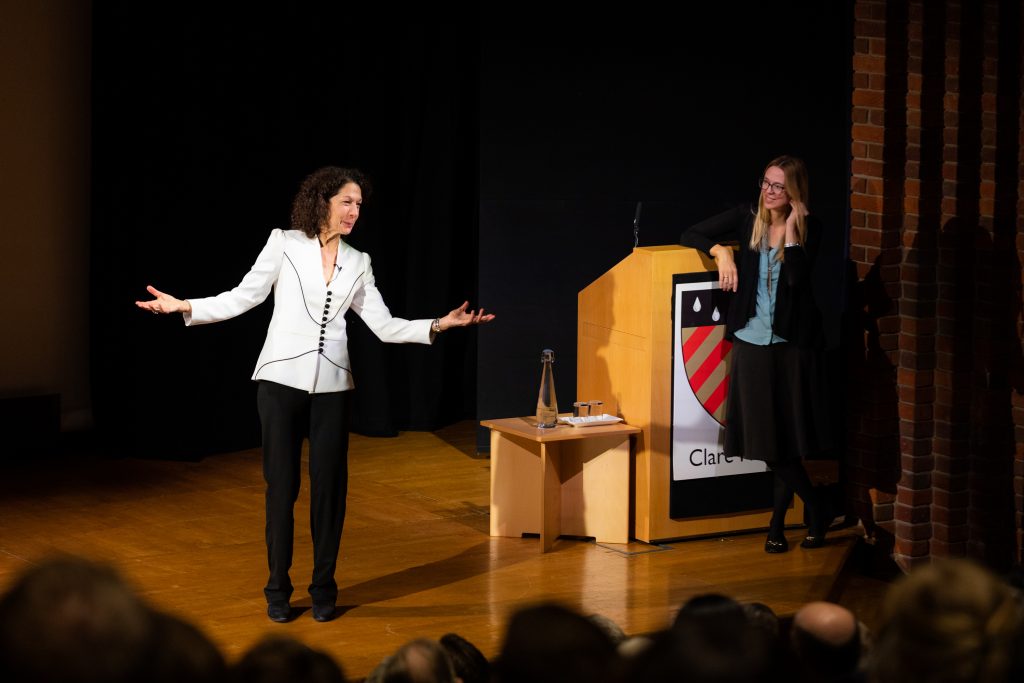
On Friday 17 October, Clare Hall was very pleased to welcome Professor Bonnie Bassler as the speaker for the 2025-26 King Lecture. Professor Bassler, Squibb Professor of Molecular Biology at Princeton University and a Howard Hughes Medical Institute Investigator, delivered a fascinating talk that drew great interest from members and guests alike.
The talk titled ‘Tiny Conspiracies: How Bacteria Talk to Each Other’ offered remarkable insights into the hidden world of bacterial communication and cooperation. Bacteria are tiny, ancient organisms that play both harmful and beneficial roles in the living world. Some are capable of causing disease in humans, animals, and plants, while others are essential for keeping them alive. How do such small creatures carry out such big jobs?
The answer lies in their ability to work together. Bacteria communicate, count their numbers, and act collectively. They “talk” to one another using chemical molecules that they release into their surroundings. These molecules travel from cell to cell, and when they build up to a certain level, the bacteria detect them through receptors on their surfaces. This process, known as quorum sensing, allows bacteria to coordinate their behaviour on a population-wide scale. Through quorum sensing, bacteria can synchronise activities that would be ineffective for an individual cell acting alone but become powerful when performed by the group. These include virulence, biofilm formation, and the exchange of DNA.
The talk explored how quorum sensing enables bacteria to function as organised communities capable of complex behaviour. It also highlighted current biomedical research focused on developing therapies that interfere with bacterial communication. Such approaches could offer new ways to combat pathogenic bacteria of global importance.
2024-25
Reading your DNA
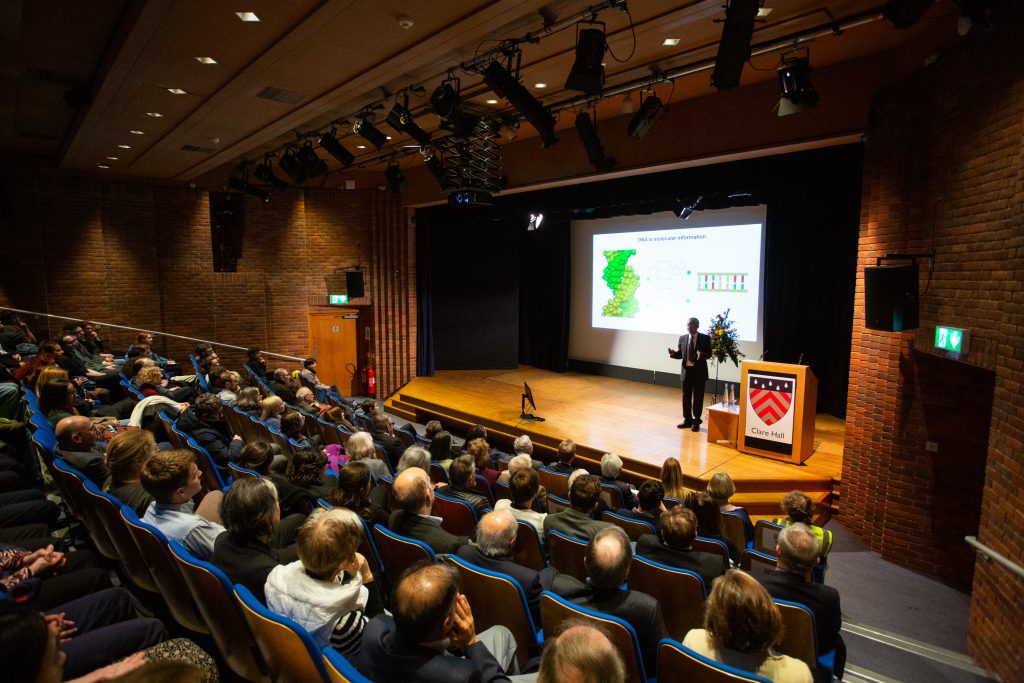
On Tuesday 18 February, we were honoured to welcome Sir Shankar Balasubramanian as our speaker for the sixth King Lecture at Clare Hall. Sir Shankar Balasubramanian is the Herchel Smith Professor of Medicinal Chemistry at the University of Cambridge and senior group leader at Cancer Research UK’s Cambridge Institute.
Sir Shankar’s lecture, titled ‘Reading your DNA,’ explored the journey and scientific foundations of developing his company Solexa (now Illumina) that has made routine, accurate, low-cost sequencing of human genomes a reality and has revolutionised biology.
The International Human Genome Project used an approach developed by Fred Sanger to generate the first human genome reference in a global collaboration that spanned a decade. Over 20 years ago, during the course of some basic scientific experiments, a collaboration with Sir David Klenerman and co-workers, unexpectedly led Sir Shankar and his team to conceive and then pursue a different way of sequencing DNA. The initial experiments ultimately led to a rapid, low-cost sequencing approach, which was developed and commercialised through Solexa, co-founded with Sir David Klenerman. Today the technique is able to sequence human, and other, genomes at a cost and speed that shows over a million-fold improvement compared to the beginnings of the project in 1997.
2023
The Future of CRISPR: What’s Ahead for Genome Editing
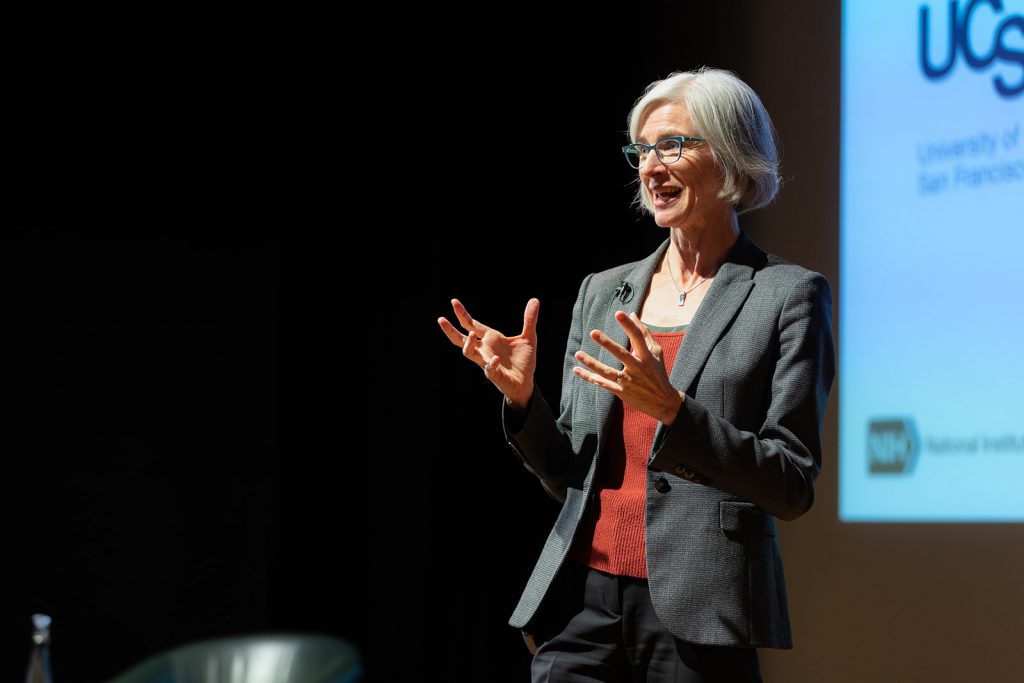
We were delighted to welcome Jennifer Doudna, Nobel Laureate in Chemistry, and Professor of Biochemistry, Biophysics and Structural Biology, as our speaker for the 2023 King Lecture on the 10th of November.
Professor Doudna’s lab’s research into RNA biology led to the discovery of CRISPR-Cas9 as a tool for making targeted changes to the genome. Current research in the Doudna lab focuses on discovering and determining the mechanisms of novel CRISPR-Cas and associated proteins; developing genome editing tools for use in vitro, in plants, and in mammals; and developing anti-CRISPR agents. Professor Doudna spoke to a full audience about CRISPR as a tool for genome editing, its impacts for human health, and the future of CRISPR.
2019
Genomic Analysis of Inherited Breast and Ovarian Cancer from Gene Discovery to Precision Medicine and Public Health
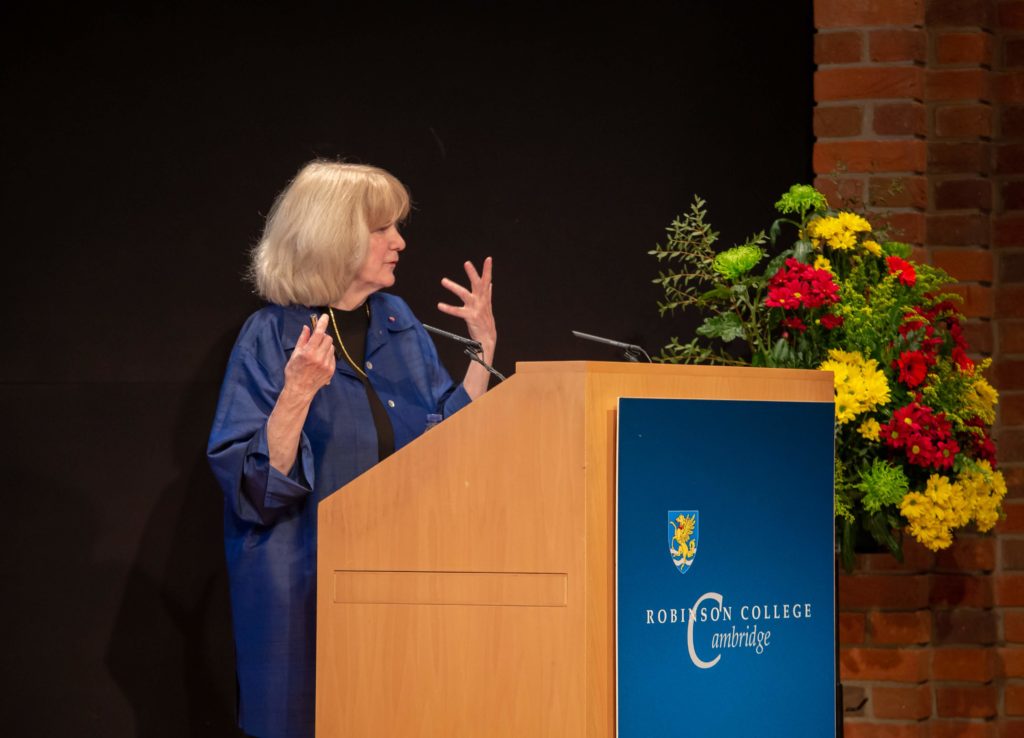
Mary-Claire King, Professor in the Departments of Medicine and Genome Sciences at the University of Washington, gave the King Lecture in March 2019. Professor King was the first to show that breast cancer is inherited in some families, as the result of mutations in the gene that she named BRCA1. In addition to inherited breast and ovarian cancer, her research interests include the genetic bases of schizophrenia, the genetic causes of congenital disorders in children, and human genetic diversity and evolution. She pioneered the use of DNA sequencing for human rights investigations, developing the approach of sequencing mitochondrial DNA preserved in human remains, then applying this method to the identification of kidnapped children in Argentina and subsequently to cases of human rights violations on six continents.
2018
Paradigm Shift in Biology
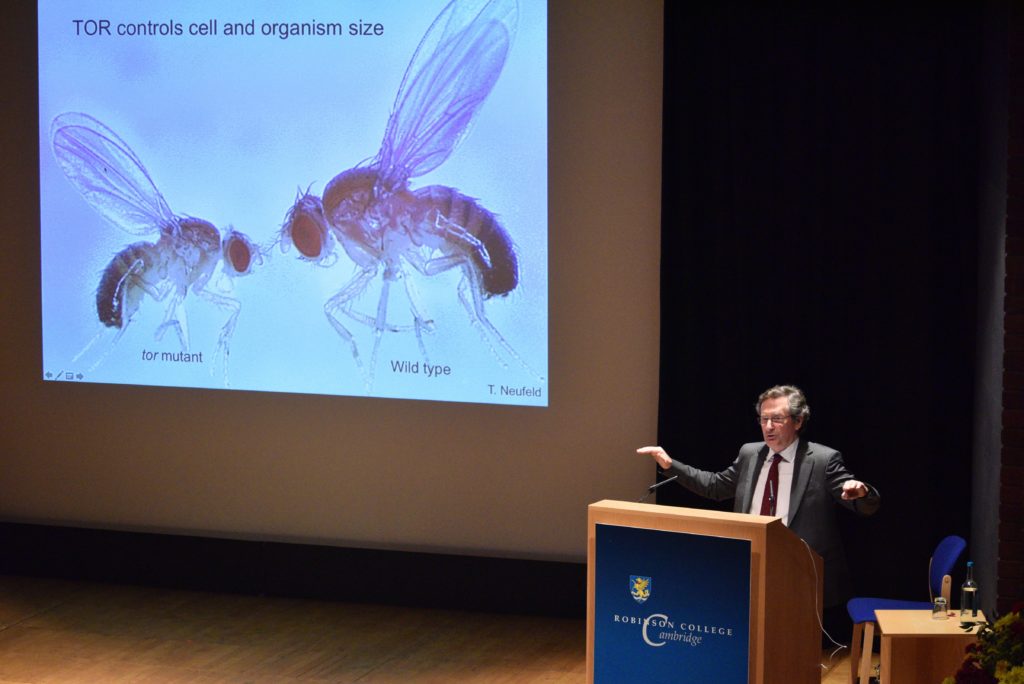
Professor Michael N. Hall, Biozentrum University of Basel, Switzerland, gave the King Lecture in May 2018. Professor Hall is a pioneer in the fields of TOR signalling and cell growth control. In 1991 he discovered a protein which regulates cell growth, cell size and cell division in yeast cells. Since the function of this protein is inhibited by the substance rapamycin, Professor Hall gave the growth regulator the name ‘Target of Rapamycin’ or for short ‘TOR’. TOR is a conserved protein kinase activated by growth factors, nutrients, and insulin. It is a central controller of cell growth and metabolism, and plays a key role in ageing and the development of diseases such as cancer, obesity, diabetes mellitus, and cardiovascular disease. Insights into TOR signalling pathways have been applied for new therapeutic strategies. In 2017, Professor Hall received the Albert Lasker Basic Medical Research Award.
2017
The Uniqueness of Biological Understanding
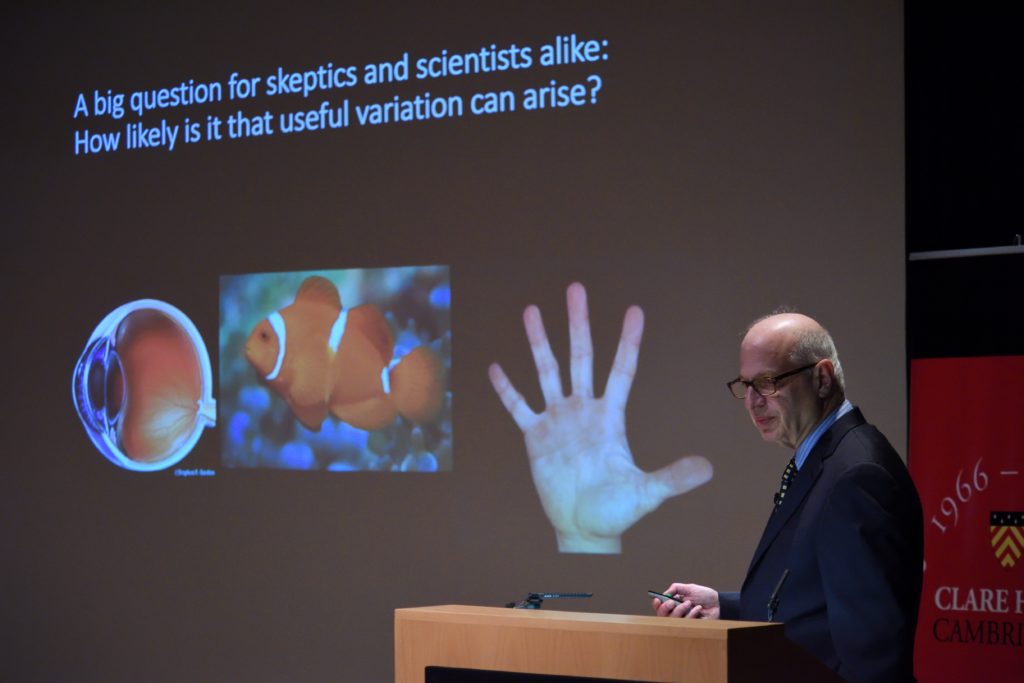
Dr Marc Kirschner delivered the second in the series of King Lectures in Biomedical Sciences, focusing on aspects of evolution and highlighting some of his key findings. Dr Kirschner was the founding chair of the Department of Systems Biology. He and John Gerhart are co-authors of Cells, Embryos, and Evolution (Blackwell, 1997) and The Plausibility of Life: Resolving Darwin¹s Dilemma (Yale University Press, 2005). Dr Kirschner was elected Foreign Member of the Royal Society of London and as a Foreign Member of the Academia Europaea in 1999. In December 2003 he received the E.B. Wilson Medal, the American Society of Cell Biology¹s highest scientific honour. He is a member of the National Academy of Sciences and the American Academy of Arts and Sciences, and has served on the Advisory Committee to the Director of the National Institutes of Health and as President of the American Society for Cell Biology. Dr Kirschner¹s laboratory investigates three broad, diverse areas: regulation of the cell cycle, the role of cytoskeleton in cell morphogenesis, and mechanisms of establishing the basic vertebrate body plan.
2016
The Paradoxes of Scientific Life in America
Dr Harold Varmus delivered the inaugural King Lecture in Biomedical Sciences in April 2016, at the MRC Laboratory of Molecular Biology. He gave an account of past, present and future challenges in cancer research, followed by a lecture at the Wellcome Trust Sanger Institute, describing current research in the Varmus Laboratory. Finally, Clare Hall members and scientists from around Cambridge gathered for a lecture titled ‘The Paradoxes of Scientific Life in America’ – a reflection on Professor Varmus’ career in research and the many challenges facing those undertaking a scientific career.
Dr Varmus received the Nobel Prize for Physiology or Medicine in 1989, jointly with J. Michael Bishop, for their discovery of the cellular origin of retroviral oncogenes. This work was performed at the University of California Medical School in San Francisco. Dr Varmus was the Director of the US National Institutes of Health / NIH (1993 – 1999), President of Memorial Sloan Kettering Cancer Center (2000 – 2010), and Director of the National Cancer Institute (2010 – 2015).
For any queries about this archive, please contact our College Archivist.
Return to the main webpage on Clare Hall’s lectures.